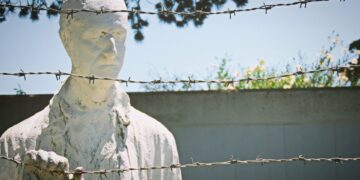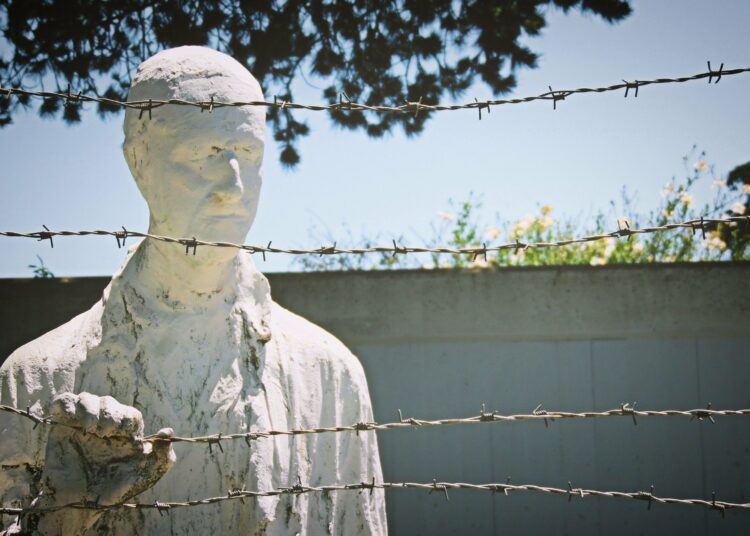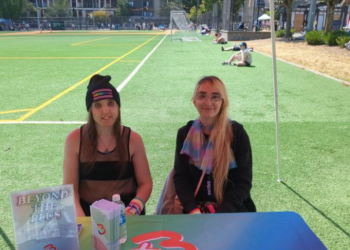Last updated on February 12th, 2020 at 11:24 am
January 27 is Holocaust Remembrance Day, a date impressed upon the calendar by the UN resolution 60/7, 1 November 2005. On January 27, 1945, the gates of the Auschwitz death camp near Oświęcim, Poland, were opened and the eyes of a world wounded by war discovered the atrocities committed by the German National Socialists. Together with the extermination of the Jewish people and political opponents, the Third Reich had started a wild euthanasia campaign in Germany, during which over 5,000 children and adolescents with physical disabilities and mental disorders were killed in the special departments of the German hospitals. The melodies of The variant of Lüneburg, the fabula in musica taken from the novel of the same name, published in 1993 by the Italian writer Paolo Maurensig, remind us of those icy days. This piece, through the metaphor of a terrible chess game, calls to mind the horror of those death camps. “It’s late, it’s late, now we have to go. We are exiles, exiles, and this is the sentence: however much you don’t want to, ours is a leave…”
The inviolability of human life
What did the Shoah leave us? Since childhood, at school, we have known this indelible stain on the shirt of human history. Every year, for Holocaust Remembrance Day, we listened to passages from the survivors’ diaries, attended conferences, attended theater shows. Today we also prepare hashtags and images to share on social media, with the usual punctuality imposed by social media. But have we been trained to prevent a new horror? Have we been warned? Has anyone at school ever educated us to take a critical look at today’s reality? A look that does not forget, but that is renewed at the same time, because memory alone is not enough unless it leads you to focus on the present. At stake, on the balance of history, there is the inviolability of human life. That inviolability trampled by the Third Reich then and today still mortally wounded by abortion, that only in 2019 cost 42.4 million victims; from euthanasia, which spreads over the sky of Europe; from eugenics, where prenatal tests become a justification for eliminating those who do not meet the standards of the man of the future; from religious persecutions, of which almost 300 million Christians worldwide are victims, according to the foundation of pontifical right “Aid to the Church in Need”, together with other ethnic and religious minorities crushed by totalitarian and despotic regimes. The denunciation of Nazi barbarity requires to ban forever the expression “life not worth living”. In fact, this phrase is being used today as it was in the past, but comes from different voices, and those who really care about human life have the duty to reject it, always.
What did Vincent Lambert’s mother feel in her heart?
“The clock in the living room and the grand piano that your mother played. How many notes and the keyboard, Magdalena’s notebook, you can only remember. Remember your home, as far as you can. Remember, because never again, never again will we go back…”: it is always “Lüneburg“. It is the nightmare of those who have had their lives, their families, their homes torn away by a power they could not rebel against. Maybe in front of the sad, but resigned looks of the neighbors, maybe among those who had not spoken and so doing had spared their lives, perhaps also receiving a reward for their silence. It is the tragedy of those who, from the inside of the nightmare, chose martyrdom in order to keep alive the glimmer of hope. The dark is always lurking, ready to become the weapon of a new ideology, with a different mask, but with the same oppressive and anti-human traits. Hate for man, contempt for fragility, repulsion for truth, struggle against Heaven. “In the mother’s heart the child’s smile is not canceled, in the heart, white souls in the sky do not forget, no matter how bad it is, do not forget…”. What did Viviane Lambert, the mother of the euthanized Vincent Lambert (1976-2019), feel in her heart during this unimaginable 2019? Your son cannot live because he is disabled. Because he is not productive. Because he is a cost. Because he breaks through the delusion of omnipotence of today’s man. Our conscience is prompted by constant black wave return alarms, almost always near elections. Yet how many slimy hands this black wave has. The hands, for example, of those who decide that someone’s life is not worth enough to deserve some water and food. And this happens in the most advanced countries, culturally and economically.
Sentinel, how far is the night?
How to live Holocaust Remembrance Day well? Remembering the night of humanity in the death camps. But those white souls in the sky ask us for a solemn commitment to keep watch, like sentinels in the morning, so that hatred for man does not return. Even when hatred is called love, even when truth is called a lie, even when darkness has found servants in the world of politics, information, perhaps even in unthinkable places. “And still the night holds its breath, in a prolonged apnea. But not for much longer, that the sun of his felt hat raises his black brim…”. Even now, especially now, we are called to protect the human. To always defend life, especially when it is fragile, when it is sick, when it is old, because it is there that the Mystery remains hidden. It doesn’t matter if life is threatened in an extermination camp or in a modern clinic. It doesn’t matter if the decision about who should live and who must die is taken by a despot or a doctor, a judge or an intellectual. Those who care for human are called to stand up and keep watch through the night. “IFamNews” was born for this. The dark frightens, the dark isolates. And when you’re alone in the dark even a battery-powered flashlight would satisfy you. You would be ready to do anything to get it. Sentinel don’t give up, don’t doubt, don’t settle for less! Dawn is near. “And in the first ray of sunshine there is a flapping of wings: the larks rise high and, like the heart, between heaven and earth they remain suspended…”.




















Discussion about this post